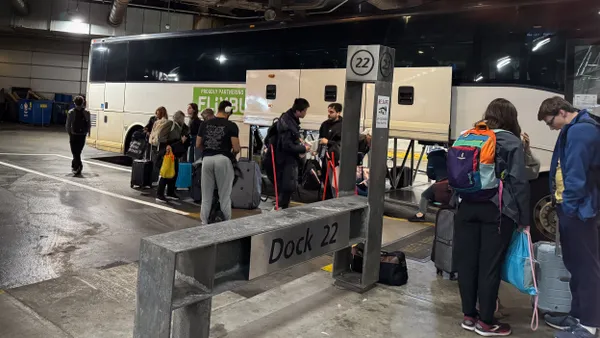UPDATED, June 7, 2018: Sacramento, CA's SmaRT Ride microtransit service was awarded a $12 million grant to expand to 12 new communities in the city, according to a statement from Sacramento Regional Transit. Sacramento Transportation Authority (STA) Chair Jeff Harris said the grant was due to the program's "incredible success in such a short amount of time," since the pilot was first announced in February.
The grant is expected to cover operational costs of the on-demand service for the next 2.5 years. Franklin Corridor and South Sacramento were identified as the next communities for SmaRT Ride, with service expected to start in late July.
Dive Brief:
- The Sacramento, CA Regional Transit agency (SacRT) is launching a six-month microtransit pilot in its Citrus Heights suburb in February, according to The Sacramento Bee.
- The microtransit service — to be operated by SacRT instead of through a public-private partnership — will cost the city about $25,000 for needed software. SacRT's 2018 budget already allows for the cost of two shuttle buses and drivers.
- The pilot, which will enable riders to request specific pick-up and drop-off locations, is being put in place to improve existing "dial-a-ride" bus services. The Sacramento Bee reports that the on-demand service can be requested via smartphones, though further details are unclear. SacRT did not respond to Smart Cities Dive's request for comment in time for publication.
Dive Insight:
Following a trend that took off in 2017, more and more cities are looking to microtransit as a way to improve first mile/last mile transportation. Sacramento is just one of many California municipalities seeking microtransit opportunities. Even the city's neighbor, West Sacramento, partnered with ride-share company Via to launch an on-demand microtransit service this spring.
Sacramento's decision to shake up its transit offerings is wise, especially following SacRT's "dramatic" drop in transit ridership last year — a deficit of more than 2 million passengers, according to CBS Sacramento. SacRT spokeswoman Devra Selenis told The Sacramento Bee that the agency believes this type of service "could be the future for all our neighborhood service," if SacRT can keep rides less expensive than city-wide ride-share competition.
Though, as noted by transportation expert Dan Sperling in an interview with The Sacramento Bee, microtransit is a new trend that most cities have little experience with — and its viability is uncertain. By embracing partnership opportunities with experienced ride-share services such as Via and Lyft, cities have a better shot at success. Yet Sacramento's decision to run a microtransit service alone is a seemingly unprecedented move. If the city finds success in its system, however, it will likely encourage other metropolitan areas struggling with transit solutions to branch out and invest in the trend.












